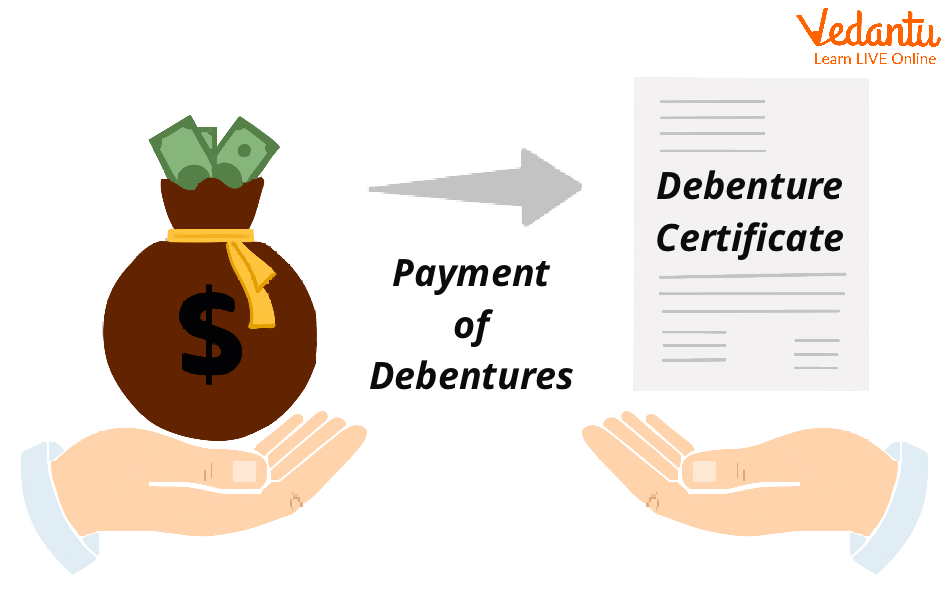




An Overview
Let's carefully examine redemption through acquiring one's debentures for prompt cancellation. One can redeem debentures similarly by being bought on the open market when redeemed before their maturity date without giving the debenture-holders the required notice. Except as otherwise provided in the conditions of the issuance, a firm is not prohibited by law from acquiring its debentures.
There are several reasons to buy debentures on the market, including the location of the Purchase of debentures for cancellation and while buying debentures as an investment.
What is a Debenture?
A bond or other financial instrument secured by collateral is referred to as a debenture. Debentures must rely on the issuer's trustworthiness and reputation for support because they lack a collateral backstop. Debentures are commonly issued by both businesses and governments to obtain cash or money. Debentures are financial instruments that typically have terms longer than ten years and are not secured by any kind of security. Only the issuer's creditworthiness and reputation are used to support debentures. Debentures are commonly issued by both businesses and governments to obtain cash or money. While some debentures have the option to convert to equity shares, others do not.

Debenture Meaning
When Debentures are Purchased for Investment
When its Own Debentures Are Purchased by the company for Investment from the open market, the company may choose to keep its debentures as an investment for as long as it deems appropriate. Therefore, the own debentures account is a balance sheet asset carried over from year to year.
When a company invests in its debentures, the total debentures outstanding will also include its acquired debentures. The customary practice is to disregard interest on such debentures and hold the claim due to third parties liable when the company develops its debentures for cancellation. Debentures held by the company as outsiders are retained until they are cancelled, at which point interest is due on the entire amount of the debt.

When Should we Purchases Debenture
Cum-Interest and Ex-Interest
The issue of interest can be disregarded if a Company buys its debentures in the market soon after the interest on such debentures has been paid. Instead, the interest will be paid to the seller, the previous holder of the debentures, when the debentures are bought on the day the interest is due.
A company can buy its debentures before the day on which the interest is due. In this scenario, the seller is qualified to receive interest for the time he owned the debentures. Now, whether interest is included in the purchase price of debentures made during the interest period arises.
When the price includes interest (cum-interest), the acquiring business is entitled to the accumulated interest, and the accrued interest will not be paid to the seller. In contrast, if the price is ex-interest, the price is excluded from the claim, meaning that the seller is entitled to collect the accumulated interest rather than the purchasing firm.

Cum-Interest and Ex-Interest
Redemption by Purchase of Own Debentures for Immediate Cancellation
If there is, one should move no sinking fund, the profit on debenture redemption to the capital reserve account because it is a capital profit. However, if there is one, the abovementioned earnings should be paid to the Sinking Fund Account. On the other hand, the loss on the redemption of debentures is a capital loss and should, as a result, be offset against either Capital Profit or Securities Premium Account.
From profits, the company shall transfer a sum equivalent to the nominal value of the cancelled debentures to the general reserve.
Treatment of Purchase of Debentures and its Cancellation
"Own Debenture Account" (or Investment in Own Debenture Account) shall be debited against cash paid for it when Company's debentures are acquired. Purchase own debenture should be handled similarly to other assets in accounts. The paid-up value of the debenture acquisitions should be deducted as and when the Company cancels the investments in its Own Debenture Account. When the Company promptly cancels its debentures following the acquisition, the remaining debentures are decreased by the cancellation amount. As a result, the Company won't have to continue paying interest on these debentures after the redemption. The Profit and Loss on redemption of the Debenture Account should be credited or debited with the gain or loss on debenture redemption.

Accounting Treatment of Purchase of Debenture
Debentures: Are They Risky Investments?
Debentures are debt securities, making them less risky than purchasing ordinary stock or preferred shares of the same corporation. In the event of bankruptcy, holders of debentures would likewise be regarded as more senior and have priority over those other sorts of investments.

Are Debentures Risky to Purchase?
However, these loans are intrinsically riskier than secured debts because any collateral does not support them. As a result, they may have comparatively higher interest rates than other comparable, collateral-backed bonds from the same issuer.
In actuality, debentures include both U.S. Treasury bonds and U.S. Treasury bills. Even though they lack collateral, they are regarded as risk-free assets.
Journal Entry for Purchase of Own Debentures in the Open Market
Solved Example with Journal Entry
Question: Mr. A bought twenty 12% debentures at Rs. 98 per unit on April 1, 2007 (cum-interest). Interest on debentures is due every six months, on June 30 and December 31. The fiscal year is always considered closed as of December 31. Write journal entries for the same.
Solution:
Working Notes:
Here's how you figure out the price and interest:
1. Timeframe (in months):
January 1, 2007, to March 31, 2007. This is a three-month timeframe.
2. Total Interest Accrued:
Rs. 2,000 x 3/12 x 12% = Rs. 60
3. Cost:
Rs. 98 x 20 = Rs. 1,960 – Rs. 60 = Rs. 1,900
Conclusion
A corporation must meet a unique requirement to redeem by purchasing in the open market. The Articles of Association provide the corporation with the right to buy its debentures on the open market. This technique is used by the corporation mainly when they are prepared to purchase their own Company's debentures at a discount on the stock market. Additionally, they could desire to buy it to avoid paying the interest that would have been due on these debentures. The Companies Act states that a corporation may redeem its debentures by purchasing on the open market if its articles of association permit it.
FAQs on Purchase of Debentures in the Open Market
1. What does the 'purchase of own debentures in the open market' mean in accountancy?
The purchase of own debentures in the open market refers to the process where a company buys back its own debentures from the stock market before their maturity date. This action is a method of redemption of debentures. The primary purposes are either to cancel the debentures immediately, thereby extinguishing the liability, or to hold them as an investment for potential resale in the future.
2. Under what conditions can a company purchase its own debentures from the market?
A company can purchase its own debentures from the open market only if it is explicitly authorised by its Articles of Association (AoA). Without this provision in the AoA, a company is not permitted to buy back its own debentures. This ensures that the action is within the legal framework governing the company's operations.
3. What are the main objectives for a company to purchase its own debentures?
A company buys its own debentures from the open market for several strategic reasons. These are fundamentally different from shares and debentures issued to raise capital. The main objectives include:
Immediate Cancellation: If the debentures are trading at a price lower than their face value, the company can buy them back and cancel them, resulting in a profit on cancellation.
Saving on Interest: By cancelling the debentures, the company saves on the future interest payments it would have had to make until maturity.
Holding as an Investment: If the company anticipates that the market price of its debentures will rise in the future, it can purchase them at a lower price and sell them later for a profit.
Maintaining Solvency Ratios: Reducing long-term debt can improve the company's financial ratios, such as the debt-to-equity ratio.
4. What is the accounting treatment when a company purchases its own debentures for immediate cancellation?
When debentures are purchased for immediate cancellation, the liability is extinguished. The accounting entries aim to remove the debenture liability from the books and recognise any profit or loss on the transaction. The primary journal entry is to debit the Debentures Account with its nominal value, credit the Bank Account with the purchase price, and transfer the difference (profit or loss) to the 'Profit on Cancellation of Debentures' or 'Loss on Cancellation of Debentures' account. You can find detailed problem-solving steps in the NCERT Solutions for Class 12 Accountancy Chapter 2.
5. How is the profit or loss on the cancellation of own debentures calculated and treated?
The profit or loss on the cancellation of own debentures is the difference between the nominal (face) value of the debentures and their purchase price (including any brokerage costs).
Profit on Cancellation: Occurs when Purchase Price < Nominal Value. This profit is of a capital nature.
Loss on Cancellation: Occurs when Purchase Price > Nominal Value. This loss is a capital loss.
The profit on cancellation must be transferred to the Capital Reserve account, as it is a capital gain. A loss on cancellation is written off against the Securities Premium Reserve or the Statement of Profit and Loss. For a full recap, see the Class 12 notes on Issue and Redemption of Debentures.
6. What is the difference between purchasing debentures for immediate cancellation versus as an investment?
The key difference lies in the accounting treatment and intent.
For Immediate Cancellation: The debentures are cancelled, and the company's liability is permanently extinguished. The Debentures account is debited, and any profit is transferred to the Capital Reserve.
As an Investment: The company does not cancel the debentures. Instead, it holds them as an asset. A new asset account, 'Own Debentures Account', is debited. These debentures are considered investments and can be resold or cancelled at a later date. They are shown as a deduction from 'Long-Term Borrowings' in the Balance Sheet.
7. Why is the profit on the cancellation of own debentures transferred to the Capital Reserve and not the Profit & Loss Account?
The profit on the cancellation of own debentures is considered a capital profit, not a revenue profit. This is because it does not arise from the normal, day-to-day operating activities of the business. Instead, it results from the settlement of a long-term liability, which is a capital transaction. According to accounting principles, capital profits must be transferred to the Capital Reserve and are generally not available for distribution as dividends to shareholders.
8. Does the requirement for creating a Debenture Redemption Reserve (DRR) apply when debentures are redeemed by purchase in the open market?
No, as per the Companies Act, 2013, and SEBI guidelines, the creation of a Debenture Redemption Reserve (DRR) is not required for debentures that are redeemed by purchasing them from the open market. The DRR requirement applies to other methods of redemption, such as redemption in a lump sum at maturity or in instalments. This exemption simplifies the process for companies choosing to redeem their liabilities through open market operations. You can learn more about the specific rules on the Debenture Redemption Reserve (DRR) page.























